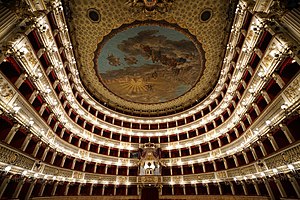
Back Escola napolitana d'òpera Catalan Neapolská operní škola Czech Neapolitanische Schule (Musik) German Napola Skolo Esperanto Escuela napolitana de ópera Spanish Napolin koulukunta Finnish École napolitaine de musique French Նեապոլյան օպերային դպրոց Armenian Sekolah Neapolitan ID Scuola musicale napoletana Italian
You can help expand this article with text translated from the corresponding article in Italian. (April 2023) Click [show] for important translation instructions.
|

In music history, the Neapolitan School is a group, associated with opera, of 17th and 18th-century composers who studied or worked in Naples, Italy,[1] the best known of whom is Alessandro Scarlatti, with whom "modern opera begins".[2] Francesco Provenzale is generally considered the school's founder.[3] Others significant composers of this school are Giambattista Pergolesi, Domenico Cimarosa and Giovanni Paisiello.
It is with the Neapolitan school...that the History of Modern Music commences—insofar as that music speaks the language of the feelings, emotions, and passions.
— Schluter[4]
The Neapolitan School has been considered in between the Roman School and the Venetian School in importance.[4]
However, "The concept of Neapolitan school, or more particularly Neapolitan opera, has been questioned by a number of scholars. That Naples was a significant musical center in the 18th century is beyond doubt. Whether the composers working in Naples at that time developed or partook of a distinct and characteristic musical style is less clear" since so little is known about the repertory.[1]
- ^ a b Don Michael Randel (2003). The Harvard Dictionary of Music, p. 549. ISBN 978-0-674-01163-2.
- ^ Paul Henry Lang (1997). Music in Western Civilization, p. 453. ISBN 978-0-393-04074-6.
- ^ Robinson, Michael F.; Monson, Dale E. (2002) [1992]. "Provenzale, Francesco (opera)". Grove Music Online. Oxford, England: Oxford University Press. doi:10.1093/gmo/9781561592630.article.O002372. ISBN 978-1-56159-263-0. (subscription or UK public library membership required)
- ^ a b Schluter, Joseph (1865). A General History of Music, p.47. R. Bentley.